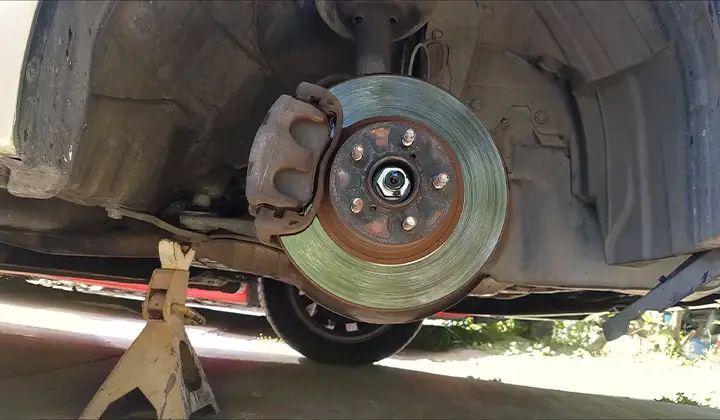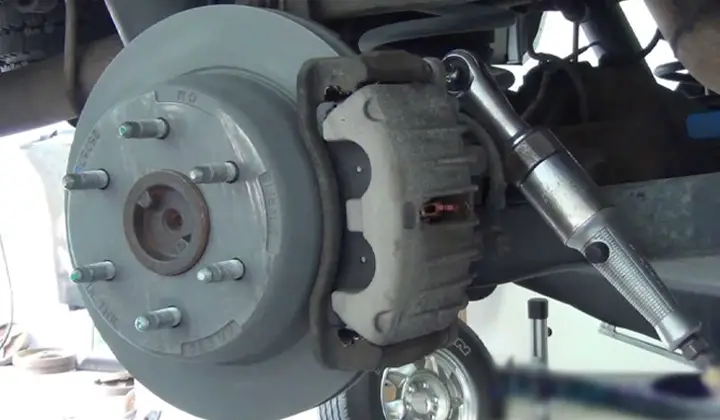Undersized parts, warped rotors, polluted pads, and excessive heat causes the brake pads to chatter. Sometimes the problem lies in incorrect sizes or it can also be caused by a loose disk.
Contents
Types of brake noise
There are possibilities of three types of brake noise besides chattering.
Squeaking
This noise is considered the most common bad brake noise among others. Squeaking occurs when the brake pads unfolded cannot dissipate the friction. The volume of the squeak can change with speed and brake force, but the tone remains constant due to the mass of the rotor.
Some brake pads are designed to have an indicator that produces a loud squeal when the friction material is worn down. That means this requires new brake pads.

Grinding sound
There are plenty of sources behind such a sound. A rotor surface with excess rust or pitting from mud and road salt will cause grinding while stopping. A faulty wheel bearing creates a vibration that transfers to the brake caliper and pads. Thus, this can cause the brakes to squeal or grind.
A stone jammed between the rotor and brake backing dust shield will also make a grinding sound while driving or braking.
Brake fade
Brake fade is a loss of braking power due to overheated pads and rotors become unable to generate sufficient friction to slow down a vehicle. Excessive heat can cause brake pad friction material to weaken and rotors to crack. Therefore, overheated brakes squeak and squeal.
Warnings
Brake parts have a limited life span. They need regular check-ups because sometimes this leads to replacing those parts to work functionally.
Symptoms
On your dashboard, the red or yellow light indicators will indicate any kind of problems related to the brake. Actually, the chattering of brakes originates because of the grabbing of the brakes and slight vibration at low speeds to more violent shaking.
There will be a time when you apply the brakes; you will find some shaking in the steering wheel. The fluid leaking will make you feel a soft brake pedal.
Brake noise
Brake noise is a common sign of a warped brake rotor. As a warped brake rotor spins, it can strike against the brake pads in an abnormal manner which causes brake noise. This type of brake noise is commonly heard. A clanking or chattering noise is heard during vehicle braking.
Warped brake rotor
Brake rotors are also a valid part of a vehicle’s braking system besides brake pads. A warped or malfunctioning rotor can seriously reduce the efficiency of the braking system, which leads to noises like chattering. Thus, they show symptoms like; pulsating brake pedal, vibrating steering wheel, brake pad failure, abnormal wheel hub assembly, etc.
Reasons
Brake chatter can occur if the brake rotor is warped. A brake rattle can also be caused by a loose disc which would mean a loose wheel. But again there is a possibility that you might be using undersize parts.
Polluted pads
There is a possibility that brake pads can cause chatter because of polluted pads. Chattering may result from the brake pads vibrating as they grab and release the surface of the rotor. This problem is easy to solve. Just try replacing the polluted pads and this will do the work.
Claw clip
Brake pad chatter can also be caused by the appropriate claw clip on the pad reverse. These claw clips are really only for pad install on the production line but do have the effect of preventing pad chatter.
Brake rotor unfolding
The brake rotor can become untie which leads to developing an uneven surface. It happens because of everyday wear and tear. The expansion and contraction of the rotor is the reason that caused unfolding.
Result
Brake pad chatters lead to the pads skewing and locking in the caliper. Thus, this makes the backing plates bend and break. The chattering can also lead to spongy brakes as the pads bounce around and knock the caliper pistons back. This cause immense problem and thereby requiring more pedal travel to snug the pads back up close to the disc.

FAQ
1. How do I stop my brakes from chattering?
Answer: Sometimes resurfacing the brake rotors can fix the brakes chattering. However, a new set of brake pads is the easiest solution to stop the brakes from chattering.
2. Why does my car vibrate when I brake at high speeds?
Answer: This probably happens because of uneven tires. But if you experience shaking while braking, then the problem lies in your wheels. However, it is best to investigate before assuming anything.
3. How do you quiet a rattling brake pad?
Answer: All you need is grease. Try to apply a very small coating of high-temperature grease to the pad backing plate ears. Where the anti chatters clips locate to help the pads slide freely. Be careful, the friction surface of your brake pads does not get grease on it.
4. How long should brake pads last?
Answer: Many factors affect the lifespan of your brake pads, from your driving habits to the type of brake pads you use. They may last about 40 thousand miles on average, but the range is quite expansive. Basically, it can be anywhere between 20 to 65 thousand miles.
Conclusion
Disregarding brake noises can lead to expensive repairs. When it comes to your car’s brakes, do not delay when you hear something weird. Because a little chatter may lead you to an accident on the road. So, revive the brake pads before something dangerous happens.
